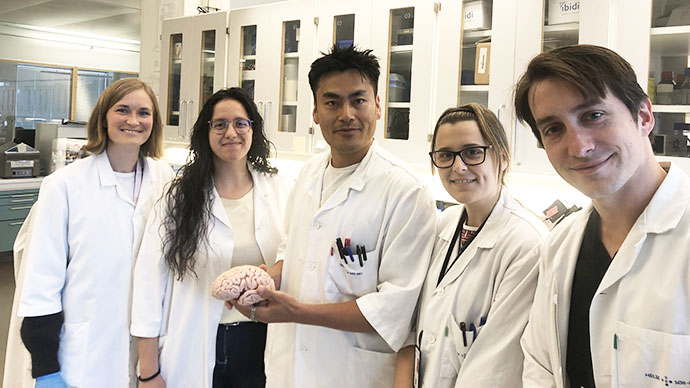The new project, NADIS is both a research project and a network for competence development for PhD students. The full title of the project is 'NAD+ International Scientist-Training'.
NADIS brings together partners from 18 institutions in eight European countries and has been awarded 2.5 million euros, of which just under 300.000 euros go to the University of Oslo (UiO).
The aim of the project is to gain new knowledge about mechanisms that can lead to Alzheimer's disease and to develop a new medicine against Alzheimer's using artificial intelligence.
– The proportion of elderly people in the population is increasing. The studies that we will conduct can contribute to applying our previous findings in clinical practice. In that way, we can strengthen the population's health so that the elderly can live good, independent and productive lives, Evandro Fei Fang says.
– In addition, the three-year NADIS project will give us the opportunity to train talented young researchers, and to bring Norway into the European network of researchers working in this field, he adds.
Evandro Fei Fang is an Associate Professor at the Department of Clinical Molecular Biology at the Institute of Clinical Medicine, UiO and at the Akershus University Hospital. He will lead UiO's contribution to the project.
Will study a substance in the cells called NAD+
NAD+ is a type of substance called a metabolite. It is formed during the metabolism in the cells.
Metabolism is crucial for the cells to get energy for vital processes and to be able to produce new organic material.
However, cells produce less NAD+ as we age. Evandro Fei Fang and the other researchers in NADIS want to find out more about the mechanisms behind this.
– Although it is widely recognised that NAD+ is important for our survival and for maintaining good health, there are still many unanswered questions. For example, what are the mechanisms behind the decline in the production of NAD+ as we age? How can we strengthen this production in a simple way? Evandro Fei Fang says.
The aim of the project is to develop a new medicine against Alzheimer's disease
Furthermore, the researchers will investigate how NAD+ can ensure that more brain cells maintain their health and function in patients with Alzheimer's disease. An early study in 2019 from the Fang laboratory showed that NAD+ was reduced during ageing and in Alzheimer’s disease. Fang and his colleagues also found out that NAD+ supplements reduced memory loss in mice with Alzheimer’s disease . In the new project, they aim to explore this drug development path further.
– If we find out how we can strengthen the production of NAD+ in elderly patients, it could be a starting point for the development of a new medicine, the researcher points out. He adds:
– I have been studying NAD+ in connection with age-related diseases such as Alzheimer's disease for 10 years. The basic research that we have conducted allows us to take our research a step further. We are not only publishing a new article, but in this project, we aim to develop a medicine against a very devastating disease for which there is currently no curative treatment.

Artificial intelligence can be used to identify potential active ingredients for a new medicine
The researchers will use artificial intelligence to develop a possible new medicine. The Fang laboratory has pioneered a new artificial intelligence technique to develop drug candidates for Alzheimer’s disease with success. The level of NAD+ in the cells is controlled by the production and consumption of the substance in the cells. The idea behind the medicine is to increase the cells' production and decrease the cells' consumption of NAD+.
– There are already some active ingredients on the market, but these have significant side effects. With the help of artificial intelligence, we can modify the structures of these substances so that they become more effective and gentler on, for example, the intestine, Evandro Fei Fang says.
The Institute congratulates

– It is very gratifying that UiO is a partner in this exciting and important Alzheimer's project. For us at Campus Ahus, it is particularly pleasing that one of our young, most talented researchers, Associate Professor Evandro Fei Fang, leads UiO's contribution in this major Horizon Europe project, Professor and Head of Campus Ahus Torbjørn Omland says.
NADIS is coordinated by the Academisch Medisch Centrum at the University of Amsterdam (UvA). The project is led by Professor Riekelt Houtkooper at the same university. The other participating institutions come from Germany, Italy, Finland, the Netherlands, Denmark, Switzerland, and Spain.
